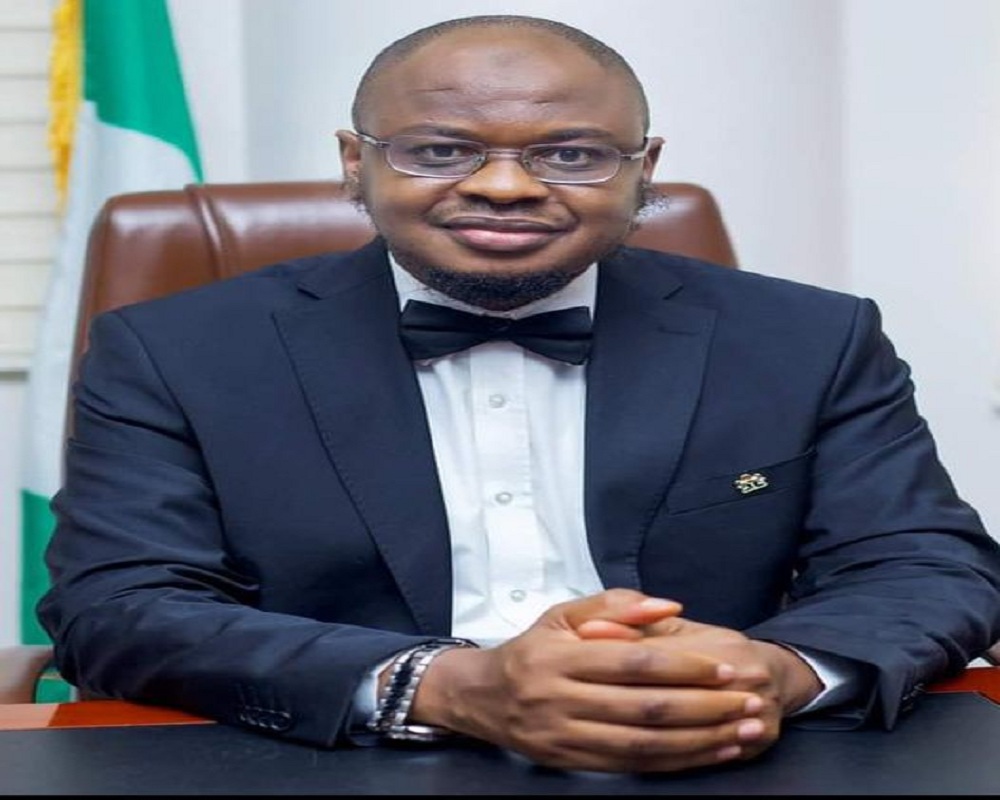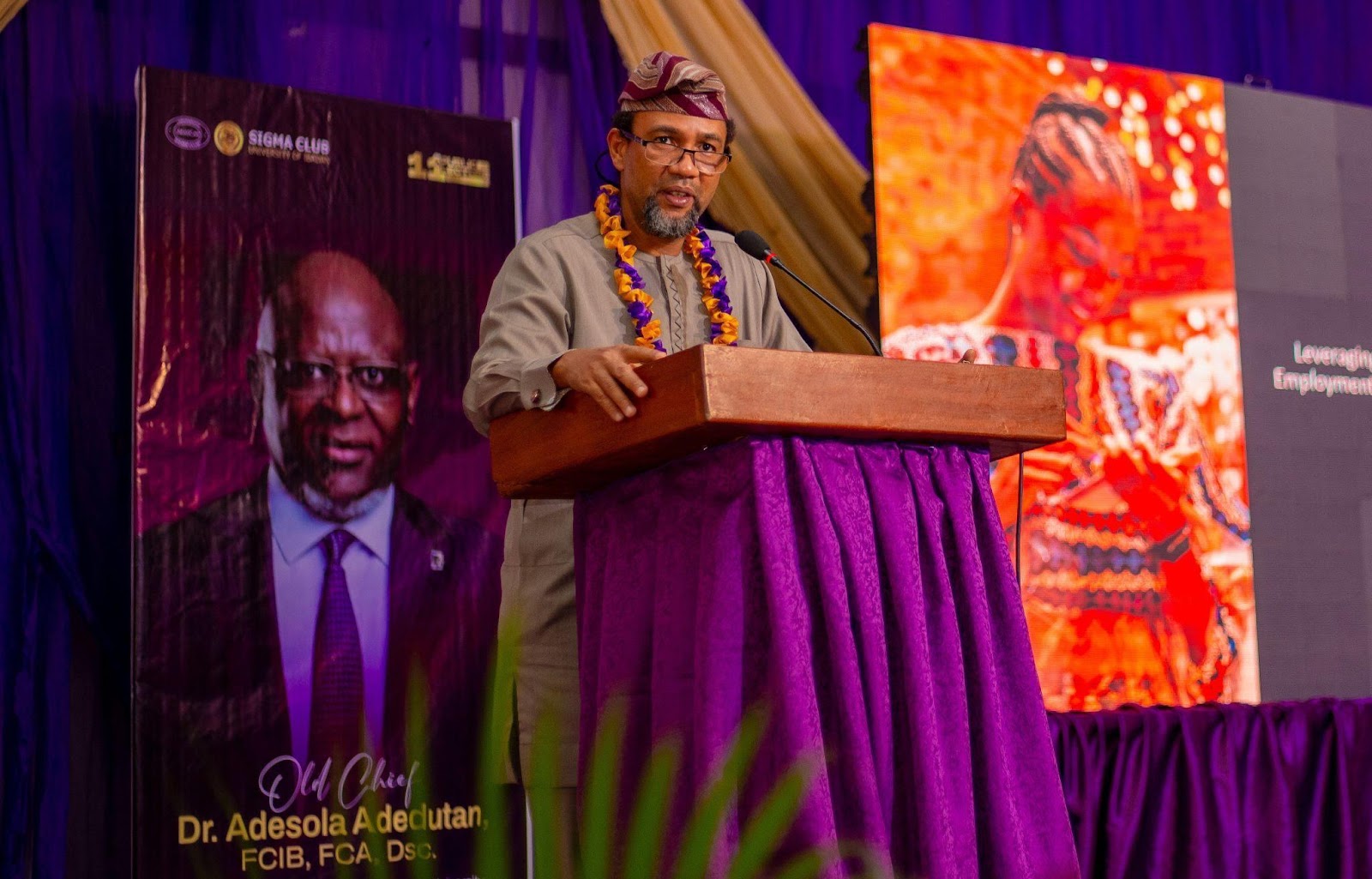Telecom
NDEPS has Impacted Nigerian Economy Significantly — Prof. Pantami

The implementation of the National Digital Economy Policy and Strategy, (NDEPS) in less than two years of its launching has been said to have had a significant impact on the Nigeria’s economy with the digital sector contributing to the GDP an unprecedented 17.90% in second quarter of 2021 from 13.83% in 2018.

Prof. Isa Ali Ibrahim Pantami, minister of Communications and Digital Economy, disclosed this in his keynote speech titled “Driving the Implementation of the National Digital Economy Policy for a Digital Nigeria: The Journey So Far” in Athens, Greece at the just concluded 14th International Conference on Theory and Practice of Electronic Governance (ICEGOV 2021.)
The Minister, who was represented at the conference by Mallam kashifu Inuwa Abdullahi, director general, National Information Technology Development Agency, decried Nigeria’s loss at previous industrial revolution maintained that Nigeria has to make strategic decision to join the digital bandwagon as it cannot be left behind in this digital age.
He said, “We lost totally in the past industrial age but we must not lose in today’s digitalization and the digital economy, driven by the Fourth Industrial revolution. Industry 4.0 is the next phase of digitalization.
“The digital economy is developing at a remarkable rate, and it has been widely accepted that it is the single most important driver of innovation, competitiveness and growth.”
Prof. Pantami expressed that the attainment of the Sustainable Development Goals, (SDG) would largely relies on the increased proliferation of new technologies and innovations that is currently revolutionizing all sectors of the global economy.
While ascribing that the success Nigeria is recording recently to the re-designation of ministry of communications to Ministry of Communications and Digital Economy and the launch of the NDEPS, the minister said “these timely and strategic actions have positioned Nigeria as an early adopter of the digital economy paradigm with the aim of taking advantage of the many opportunities that it provides.
He stated that the alignment of the NDEPS with the three focus areas of President Muhammadu Buhari’s administration of economic diversification, fight against corruption and security has contributed to the growth of the nation’s economy.
While listing 16 policies the ministry under his supervision has initiated, the minister noted that the strategic implementation of these policies and foundational initiatives of the NDEPS served as the catalyst for enabling Nigeria to exit recession after the negative effect of the COVID-19 pandemic.
Quoting from the report of the National Bureau of Statistics, (NBS) Prof Pantami maintained that the Information and Communications Technology (ICT) sector recorded the highest growth rate of all sectors of the Nigerian economy, in both the fourth quarter of 2020 (Q4 2020) and the entire year.
“The 14.7% growth rate of the ICT sector was greater than the combined 14.21% growth of the 2nd to 7th fastest growing sectors in Nigeria in 2020.
“The telecommunications sector also recorded a growth rate of 15.90% and this was its highest growth rate in the last 10 years.
“The NBS released the Q1 2021 report and the ICT sector retained its position as the fastest-growing sector of the economy, contributing 14.91%.
“In the second quart of 2021, ICT contributed an unprecedented 17.92% of Nigeria’s GDP. The Digital Economy sector has therefore proven to be vital for the diversification of the economy,” the stated.
On the nation’s security, the minister explained that various initiatives adopted are providing necessary solutions to the insecurity challenge the country is facing.
He noted that the recent presidential directive for the National Identity Management Commission (NIMC) to be moved to the Ministry is part of the government’s efforts towards accelerating the implementation of the Digital Identity Programme and enhancing security in the country.
He stated further that the country has recorded surge in the implementation of SIM-NIN linkage which stands at 64 million Nigerians with completed NIN registration.
He added that the government is committed to ensuring that the nation’s cyber space is safer with various initiatives.
On the issue of fighting corruption in the public sector, the minister stated that the government has establishes an automated IT projects Clearance process which aimed at eliminating duplication and ensure the nation derive value for her money in the implementation of ICT projects in the country adding that “From 2017 to date, the IT Projects Clearance program has registered 1,048 users, cleared 485 projects and saved N22,859,306,220.96 billion (about $58,764,283.34) for the Federal Government.”
He said, “At the Federal level, I have led the process of improving and transforming our governance processes through the implementation of different Government Digital Transformation instruments and programs such as capacity building for civil servants in different categories, the Nigeria e-Government Interoperability Framework (Ne-GIF), the Nigeria Government Enterprise Architecture (NGEA), the National Cloud Computing Policy, National Public Key Infrastructure (PKI), Government Digital Service Framework, Establishment of Digital Transformation Technical Working Groups (DT-TWGs) and ultimately, the Digital Government Transformation Performance Assessment and Toolkit through which we are here at the ICEGOV 2021 to share our experience of making IT deployment in our the public sector more efficient and creating new economic sector from Government Digital Transformation efforts.”
He mentioned the Nigerian Smart Initiative has seen to the launch of National Adopted Village for Smart Agriculture which is designed to use ICTs and emerging technologies to support the Federal Government in its drive to create more jobs for the youthful population and attract them into agriculture, improve food production, increase wealth and income of farmers and agricultural value chain players, improve food security, promote access to international food markets and ultimately a means of economic diversification.
Similarly, he stated that National Adopted School for Smart Education (NASSE) is a model introduced to the young ones early enough and introduce them to the world of technology in an engaging and innovative way.
On the Nigeria data Protection regulation, (NDPR) Prof. Pantami explained that within two years of launch, it has created about over 2000 jobs with the industry worth over $32 million.
The Minister however used the platform to appeal to the participants at the conference to contribute to the development of Nigeria’s digital economy and that of Africa and the world at large.
Telecom
Court to Decides on 9Mobile Ownership Tussle September 24

Federal High Court in Abuja has fixed September 24 to rule on several applications in the case of Abubakar Ismaila Isa, a businessman, who claims that his 43 million shares were allegedly transferred to Emerging Markets Telecommunication Services Limited, operating under the trade name 9mobile, without his consent.

The matter before Justice Mohammed Umar on Wednesday, was filed by Isa’s legal team led by Femi Atteh, SAN, in suit number FHC/ABJ/CS/1971/2024.
The plaintiff seeks an order declaring him the “beneficial owner of the 43,000,000 (forty-three million) ordinary shares held in trust for him by the 1st Defendant (Seltrix Limited) in the capital of the 3rd Defendant (Teleology Nigeria Limited).”
He accused Seltrix Limited of purportedly transferring the said shares to 9mobile without his consent, resulting in the alleged illegal change of control of 9mobile to LH Telecommunication Limited by the Corporate Affairs Commission and Nigerian Communications Commission.
Joined as defendants in the suit are Seltrix Limited, Hayatu Hassan Hadeija, Teleology Nigeria Limited, Mohammed Edewor, Emerging Markets Telecommunications Limited, CAC, NCC, LH Telecommunication Limited and General Theophilus Yakubu Danjuma (Rtd) (first to ninth defendants).
A counter-affidavit sworn to and filed on behalf of Seltrix Limited, Hadejia had described the plaintiff’s application as a reckless abuse of the court process.
He urged the court to dismiss the application and award substantial costs against the plaintiff.
He also demanded concrete evidence of any trusteeship arrangement involving him or Seltrix Limited concerning the alleged N43 million ordinary shares in the capital of the third defendant, Teleology Nigeria Limited, or any matter related to the suit.
Hadejia stated that the plaintiff’s motion, dated 27 January but filed on 28 January, was a fabrication designed to mislead the court.
At the resumed hearing, Michael Aôndoakaa, SAN, counsel for Teleology, 9mobile, and others, drew the court’s attention to his preliminary objections, asking the court to strike out the case for “being statute-barred” as it was filed out of the stipulated time required.
Telecom
MTN, 9mobile Commence Ground-breaking National Infrastructure Partnership

In a landmark move set to redefine Nigeria’s telecom landscape, MTN Nigeria Communications Plc and Emerging Markets Telecommunications Services Limited (9mobile) have officially announced the rollout of their national roaming agreement, approved by the Nigerian Communications Commission (NCC).

The three-year agreement enables 9mobile subscribers to roam seamlessly on MTN Nigeria’s expansive network, significantly extending 9mobile’s coverage and improving service quality for its customers. The partnership signals a shift toward greater industry collaboration, aligning with the NCC’s vision for a more inclusive and efficient digital ecosystem.
Beyond infrastructure sharing, the agreement drives greater operational efficiency, stronger connectivity, and an enhanced user experience. It also paves the way for deeper collaboration between the two telcos, most notably a proposed spectrum leasing deal, in which 9mobile will lease its 900MHz (5MHz) and 1800MHz (15MHz) bands to MTN for three years, further strengthening MTN’s network capacity and service quality.
“This partnership marks a bold resurgence for 9mobile,” said Obafemi Banigbe, CEO of 9Mobile. “It empowers us to meet the needs of our customers, especially youthful and enterprise users, by delivering consistent, high-quality service as we roll out city by city in the weeks ahead.”
Banigbe acknowledged the leadership of Dr. Aminu Maida, Executive Vice Chairman and the leadership of the NCC, for enabling such progressive industry collaboration, and Dr. Bosun Tijani, Honourable Minister of Communications, Innovation, and Digital Economy, for his advocacy of a resource-efficient, consumer-first telecom ecosystem.
“In today’s telecom environment, access is more strategic than ownership,” Banigbe added.
“Access to infrastructure is now more important than ownership,” Banigbe added. “Rather than duplicating networks, we’re investing in access that is commercially viable and sustainable. Network infrastructure typically accounts for 70–75% of an operator’s costs, savings here mean we can reinvest in innovation and customer experience. At 9mobile, our mantra is simple: build infrastructure where necessary, share it where possible,” he concluded”
Dr. Karl Toriola, CEO of MTN Nigeria, described the agreement as a milestone for the sector, “This collaboration underscores our commitment to industry innovation, customer-centricity, and support for the NCC’s goal of a fully connected Nigeria,” said Toriola. “It reflects our shared value philosophy, prioritizing partnerships that benefit the entire ecosystem.”
Toriola also praised Dr. Tijani’s efforts in promoting meaningful collaboration as a key driver of digital access, service quality, and nationwide inclusion.
This pioneering agreement sets a new benchmark for infrastructure sharing in Nigeria. It exemplifies how competitors can collaborate to address systemic challenges, reduce redundancies, and collectively transform the industry—ultimately delivering broader coverage, better service, and faster access to emerging technologies for Nigerian consumers.
Telecom
Karl Toriola Champions Digital Education for Employability @Sigma Club Lecture

MTN Nigeria CEO, Dr Karl Toriola delivered a strong call for digital skills adoption and curriculum reform at the 11th Public Lecture of the Sigma Club, University of Ibadan, on Thursday, July 3, 2025.

Speaking on the theme, Leveraging Technology & Digital Education for Mass Employment, Wealth Creation and Poverty Alleviation, Toriola said technology and education can drive large-scale transformation by unlocking access to both global and local job markets. He explained that digital tools enable entrepreneurship, remote work, and access to essential services, especially in underserved areas.
He pointed out several barriers: the infrastructure deficit caused by high deployment costs, poor electricity, and insecurity in rural areas; digital literacy and education gaps; gender and regional disparities; outdated or inconsistent government policies and weak public-private coordination.
Referencing a story about a high-achieving Nigerian doctor, he said, “I saw an article a few days ago about a Nigerian medical student or doctor that qualified simultaneously in [different] specializations of medicine. It’s incredible what some of our people are doing. Our youths are ready. Our systems must be ready too.”
Among his recommendations, Toriola called for expanded digital infrastructure, changes to school curricula, stronger public-private partnerships, and programs designed with gender and cultural awareness in mind. “We must make education employable,” he said. “We have to create the opportunities for students to practice what they are learning with institutions, private-sector institutions that are using those skills of the future.”
Toriola also emphasized that while automation and robotics dominate conversations about the digital economy, there is still significant opportunity in content creation, manufacturing, and agriculture. “Huge opportunities exist in Nigeria. We need to provide the environment for the Nigerian youth to thrive by driving connectivity, changing the curricula to allow our students to acquire the skills that are required in the job market of today.”
He closed with a message of encouragement, saying, “It does not matter however you start. Where you get to at the end of the day is a product of how dedicated, focused and hardworking you are. Never give up. Nigerians have an immeasurable capacity to deliver if given the right opportunities.”
Earlier, Hon. Folajimi Oyekunle, Deputy Chief of Staff to the Oyo State Governor, delivered the welcome address on behalf of Governor Seyi Makinde. He noted that the lecture’s theme was timely and aligned with the administration’s focus on innovation and inclusive development. Citing initiatives such as the Waste to Wealth program, which created 12,000 direct jobs, and the recruitment of 21,000 teachers, he highlighted efforts to improve employment outcomes in the state. He also mentioned that the state’s internally generated revenue had risen to 8.5 billion in the first quarter of 2025, compared to a pre-2019 average of 1.6 billion.
“The government so far has worked in line with all stakeholders to create an enabling environment for job creation, which gives our graduates the opportunity to be employed in government work. As a government, we continue to support and encourage wealth in the state and also to support programs like this, which in one way or the other, gives back to their school,” he said.
Other dignitaries present at the event included the Alaafin of Oyo, Oba Abimbola Owoade; Dr. Gani Adeniran, retired lecturer from the University of Ibadan’s Faculty of Veterinary Medicine, who served as Father of the Day; and Professor Gabriel Ogunmola, Chancellor of Lead City University, Ibadan.
Initiatives like MTN’s recently launched Digital Skills Academy reiterate the company’s commitment to expanding digital access and opportunity. The platform includes a career guidance tool to help users identify and pursue paths aligned with their strengths and market demand. It forms part of the MTN Foundation’s Digital Skills for Digital Jobs programme, which supports the National Digital Economy Policy and Sustainable Development Goal 4 on quality education.

 Telecom1 day ago
Telecom1 day agoMTN Nigeria Debuts Game-Changing CPaaS Platform at NextNow Forum

 Telecom2 days ago
Telecom2 days agoNCC Approves MTN, 9Mobile Roaming Collaboration Deal

 E-Financial1 day ago
E-Financial1 day agoNAICOM Issues New Licenses to SanlamAllianz Life, General Insurance

 E-Financial1 day ago
E-Financial1 day agoGTCO to Become First Nigerian Bank to List on London Stock Exchange

 News1 day ago
News1 day agoAMCON Confirms ₦100Bn Sale of Ibadan DisCo Amid Legal Disputes

 E-Financial2 days ago
E-Financial2 days agoWorld Bank Approves Extra $65m for Nigeria’s SPESSE

 E-Business1 day ago
E-Business1 day agoDomain of Deception as Attackers Deploy Spyware Under Guise of Legal Threats

 E-Financial2 days ago
E-Financial2 days agoEcobank Taps Google Cloud to Deepen Financial Inclusion




























